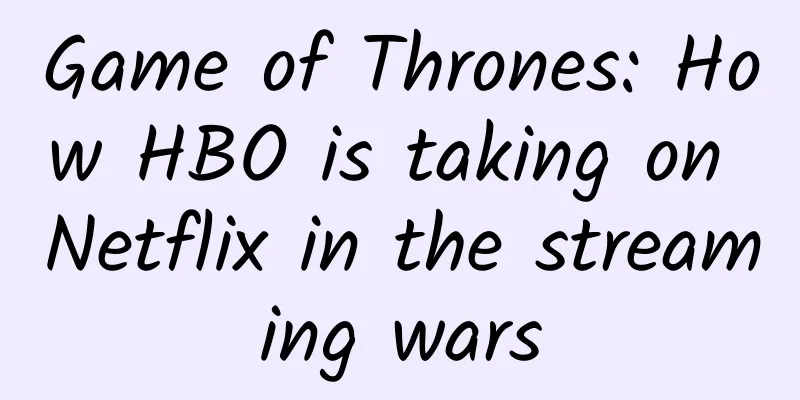Game of Thrones: How HBO is taking on Netflix in the streaming wars

|
The classic American TV series "Game of Thrones" officially returned on April 12, and at the same time, the streaming application HBO Now, produced by its producer HBO TV station, was also launched. The service will also be launched on Apple TV. Under the competition from Netflix, the birth of HBO Now is as ups and downs as the plot of "Game of Thrones". The risks of HBO Now On January 1, 2013, Richard Plepler took over as CEO of HBO, and later that month, Netflix's chief content officer Ted Sarandos announced, "Our goal is to become HBO before HBO becomes us." Since then, Netflix has launched some popular original series, such as the familiar "House of Cards" and "Orange Is the New Black", and also bought the broadcasting rights for five new Marvel series. Subscribers have also increased from 33 million to 57.4 million, revenue has increased from US$3.6 billion to US$5.5 billion, and the stock price has risen by almost 300%. "Two or three years ago, the average Netflix user watched closer to 60 minutes a day. Now it's closer to two hours," said Liam Boluk, a media strategy consultant at Redef. "Netflix is bigger than any cable network in the U.S. No matter how great HBO's programming is, how powerful it is, how profitable it is, if you look at the size and power of Netflix, HBO needs to act now." HBO CEO Piper It’s not like HBO has been standing still over the past two years. It added more subscribers in 2014 than in any year in the previous 30 years; it has demonstrated its enduring creative energy with shows like True Detective; and it has made far more money than Netflix ($1.8 billion to Netflix’s $403 million). Yet CEO Paiper is acutely aware of the threat that Netflix and its ilk pose to HBO. So Piper launched HBO Now, a standalone version of HBO Go that lets you watch nearly every episode of all HBO shows, plus a ton of movies, documentaries, and sports. And it’s not just for HBO’s existing cable subscribers (who usually pay $15 a month): Anyone with an Apple device and a monthly fee can use HBO Now without having to subscribe to HBO’s cable service. The move is risky. What if people stop subscribing to the regular HBO service? What if cable operators, which generate nearly all of HBO's $5.4 billion in revenue, get upset by the move? What if HBO Now might offer content not previously available on HBO, lacks the quality that's always been there? And will the move spur Netflix to even bolder action? Important qualities of a CEO People are expected to spend $236 billion on TV subscriptions by 2018, and Paiper thinks Now will help HBO capture a bigger share of that. But it’s a big change for a company that’s used to living the high life, never having to compete for ratings or tone down its tastes to appeal to the mass market through kitsch. Peppa started at HBO 22 years ago as head of human resources. He was gregarious and opinionated, and quickly stood out. When Jeff Bewkes took over HBO, Peppa became Bewkes's advisor, advising him on everything from marketing to corporate strategy. Bewkes is now the CEO of Time Warner, HBO's parent company. What’s impressive about Piper is that, in addition to repeatedly bringing great talent to HBO, he also helped the network fend off an early wave of competition in the mid-2000s, when AMC and Showtime competed with HBO in launching premium original content. Piper was rising through the ranks at Time Warner, a company like Time Warner where the infighting was sometimes brutal, like something you'd see on Game of Thrones. "He's a peacemaker who makes people work well together," says Jay Sures, managing director of United Talent Agency. As Bewkes puts it: If you leave your sandwich on the table, Pepper "isn't going to steal it. That's an important quality. If you want to survive in a company with all kinds of people and conflicts of interest or stubborn barriers, you have to make sure everyone knows you're a trustworthy guy." Recruiting troops HBO has been considering Netflix as a rival for several years. When HBO Go launched in February 2010, it promoted the app's 600 hours of programming as "see what you haven't seen a million times." Courteney Monroe, HBO's former senior vice president of marketing (now the CEO of National Geographic Channel), admits, "It was implicit that HBO Go was better than Netflix." Initially, HBO Go was only available by logging into a Web browser. It was a sleek, no-frills service that came with an HBO cable subscription, allowing HBO to boost its digital cachet without hurting its important relationships with pay-TV partners. Go whetted consumers' appetites. They wanted HBO Go on tablets, smartphones, and game consoles. But Go's technology was outsourced, so HBO was slow to make progress. Many people inside the company felt that HBO should have its own technology team. So in the summer of 2011, HBO hired Otto Berkes, who was considered a visionary in consumer technology and had worked at Microsoft for 18 years. He helped develop the Xbox and built a prototype tablet device years before the iPad was launched. “I joined HBO to build a world-class streaming platform and develop the technical talent and capabilities to enable it to compete directly with Netflix and other major streaming services,” Berkes said. People familiar with the matter said the streaming service would likely include all of Time Warner’s content, including Warner Bros. movies, as well as shows from TBS, TNT and TCM; a slew of cartoons and, of course, everything on HBO. The strategy was as simple as it was bold: “With better content than Netflix, why can’t you go take Netflix’s customers and revenue?” Some at HBO denied the plan was so ambitious, saying the goal was to build the company’s “own Netflix.” Nonetheless, Berkes opened an office in Seattle and began hiring dozens of technologists from Amazon , Microsoft and Zynga. Research and strategy Publicly, HBO downplayed its interest in launching a standalone app. In November 2011, HBO's then-senior vice president of digital products, Alison Moore (now an executive at NBCUniversal), told an audience at an event that they had considered a direct-to-consumer service but didn't think it was the right fit. Even when fans pleaded with them online and on social media, HBO seemed unmoved. In June 2012, 27-year-old web developer Jake Caputo created the website "My money, HBO!", imploring the company to "offer a standalone HBO Go streaming service, my money!" Within 48 hours, 163,673 people responded to Caputo's call. "My phone was about to explode," he recalled. How did HBO respond? "That's great," Moore said, but "it's not something we're going to do right away." In fact, Berkes aims to have the app out by the end of 2016. HBO is moving slowly but strategically. When Pieper was 22 years old and working for Senator Christopher Dodd, he met a political pollster named Doug Schoen. Pieper asked Schoen to survey the public about HBO and its competitors. He told Schoen, "Some people say we are at a mature stage, but I don't think so. My hunch is that we still have a lot of users to fight for. I want to find out if that is the case and why." Schoen's survey results show that there are two major groups of people who are "attractive." The first group is about 10 million households, these households have broadband Internet service, but do not subscribe to cable TV packages. Schoen believes that if the breadth and depth of HBO programs are better introduced in the marketing process, these people are likely to subscribe to HBO services. “We like to see things from our own perspective,” Pyper says. “We thought everyone knew we had first-run deals with four Hollywood studios. We thought everyone knew what HBO Go was and how much we had.” Schoen’s findings confirmed Pyper’s fears. “But people thought Netflix had more movies because they were confusing number with first-run!” he says. But there's a bigger opportunity: the 70 million American households that have cable packages but don't have HBO. Schoen thinks 15% of them are up for grabs, and they don't have HBO because it's an expensive "upgrade package" on top of basic cable. HBO subscribers spend an average of $130 a month on pay TV. Paibo believes that there is only one way to change people's impression that HBO is "expensive": convince its cable TV providers to adopt a new sales approach. In order to encourage them to put HBO in a more basic package, Paibo wants to launch an excellent broadband application to attract users away from cable TV companies to put some pressure on them. Culture clash As Pyper was strategizing, Berkes and his technical team were hard at work on a new version of HBO Go. Pyper likened Go to a BMW 5 Series sedan and said HBO wanted to “build the BMW 7 Series.” A former HBO engineer scoffed at the comparison, calling Go’s code “terrible. That’s how we would have written code in 1987.” As Go’s popularity soared, fueled by shows like Game of Thrones, its weaknesses, especially slow or disconnected streaming, quickly became a problem. The work was long and tedious. “It had 2 million lines of code, and you couldn’t edit it like a book,” said another HBO engineer. To make matters worse, HBO was also pushing Go to new platforms, including Google ’s Chromecast and Apple TV. Plans to develop an independent streaming service were constantly postponed. Berkes was not comfortable with HBO's culture. He explained his vision to everyone and explained to them that software is different from making TV series. There is no final episode for software. At Microsoft, engineers are respected. But, as actress Julia Louis-Dreyfus said, "HBO's culture is: artists are fully respected." One observer explained, "For HBO, creativity is power. And technology is 'unnecessary intrusion.'" Sudden changes Rupert Murdoch, chairman and CEO of 21st Century Fox, offered $80 billion to buy Time Warner last June. Murdoch particularly wanted HBO, which he believed was underutilized. At Time Warner, Murdoch's bid has been met with outrage, people familiar with the matter said. Time Warner is under great pressure because its stock price rose from $71 to $83 after Murdoch's bid was announced in July, and then fell to $74 after he withdrew his bid. Time Warner must prove to its shareholders that the company has its own strategy. A source said Bewkes "wanted to find a bright spot in the company," with the most potential being HBO's streaming service plans. But when asked if Murdoch's offer led them to speed up the launch of HBO Now, both Bewkes and Pieper denied it. Pieper said that when Murdoch made his offer, he had already been asking his old friend Jimmy Iovine about the situation. Pieper had helped Iovine with PR at Warner Music, and Iovine had previously sold his Beats headphone business to Apple for $3 billion. So Pieper asked Iovine if he thought Apple would be interested in becoming the No. 1 distributor of HBO Now. Iovine didn't hesitate: "Absolutely." Paiber also approached Time Warner board member Paul Wachter, who had worked on the Apple and Beats deals as an investment banker. Wachter put him in touch with Eddy Cue, Apple's head of digital media. When Cue met with Paiber at his office in New York, Paiber explained that they needed a distributor and that HBO Now would be ready in the spring of 2015. Cue was happy to make a deal with HBO. This is a very satisfying deal for both parties. Apple has been a laggard in the battle for streaming TV. And HBO is exactly the kind of high-profile partner that Apple likes, and joining forces with HBO will help jumpstart Apple TV. On the other hand, for HBO, this deal means much more than just gaining a distribution partner. Apple is the most valuable and respected company in the world, and having HBO Now debut on Apple's platform will give it an extra boost. In addition, it obviously takes much less time to build a product for just one platform than for several platforms, which means that Now can be launched earlier than the previously mentioned end of 2016. HBO and Apple signed the deal just before Time Warner’s investor conference in mid-October. The announcement of the long-awaited streaming service excited shareholders and consumers alike. The only people who were unhappy, of course, were the engineers who had to build the app. When Berkes was told of the significantly earlier deadline, he said it couldn’t be done or he could offer a more stripped-down product—“I can give you a car without doors,” Berkes’ friend Giorgio Vanzini, a former Microsoft executive who is now DirecTV’s senior vice president of product development and integration, described it. Of course, HBO executives were not happy about this. The usually casual atmosphere of the meeting in Pepper's office took on a sense of desperation. Pepper was clear with Berkes: We have to get this done. Berkes said he could have a version ready by the spring under a revised schedule. The plan was called Project Maui. Technical teams in New York and Seattle began working on the app, working weekends and nights. Meanwhile, HBO executives were considering other options. Strategic shift Last September, Shelley Brindle, HBO's executive vice president of online distribution, was at a conference chatting with an executive from MLB Advanced Media, the tech arm of Major League Baseball that has an app that streams baseball games to about 3.5 million users around the country and that also provides services to Sony, ESPN and World Wrestling Entertainment. Brandel was particularly curious about the technical support that MLB provided to WWE. Although WWE was culturally the opposite of HBO, it also had a huge content library with millions of loyal fans who wanted to watch it. In just five months, MLB Media designed a system for WWE that supported millions of people accessing the content library at the same time. "This isn't conceptual stuff," Brandl said with a laugh. "They've already built it, haven't they?" And unlike other high-tech companies that are prone to delaying projects, MLB Media is known for meeting deadlines. "Opening Day is Opening Day," said Joe Inzerillo, the company's chief technology officer. "Customers don't push Opening Day back because the bats aren't ready, so we're used to getting things built within a tight time frame." “Internally, we always felt like we overpromised, but we always met the deadline,” said a former MLB Media executive. “In the last month before Opening Day, we were always sprinting, no one was sleeping, and all the features were getting done.” That was the kind of thing Paiper would have liked to hear from his own tech team. “People want to watch HBO, and now it’s time to remove all the barriers to get them there,” Paiper said at a Time Warner investor conference on Oct. 15. He said HBO will “work with our current partners. Explore new models with new partners. There are still 80 million households that don’t have HBO, and we’re going to do everything we can to get those customers.” Brandl said that HBO's important pay-TV partners, such as Comcast, did not hear the news from Paipur in advance. These partners "didn't say anything. The reaction was neither good nor bad." Although the cable TV industry is full of intimidation and fighting, everyone needs each other: content companies need cable operators, and cable operators also need top content companies. So most cable companies hold their tongues and wait to see what surprises HBO will launch. In early November, Pepper canceled Project Maui and asked MLB Media to provide the backend technology for Now. "The world of distribution is changing every day," said Bob Bowman, head of MLB Media. "We deliver MLB content on 400 different devices. I understand HBO wants to control the technology itself, but the investment is huge, no matter who does it." Berkes had ambitiously wanted to "build HBO's own Netflix," but HBO lost confidence in him. A person familiar with the matter said that it would cost $900 million to fully implement his plan. A person familiar with Berkes insisted that this number should be analyzed in detail, and the only way to really compete with Netflix is to be willing to spend a lot of money. After all, Netflix started in the streaming field a decade earlier. In any case, Berkes's grand vision for entering HBO has become a bubble. A month after the cancellation of "Project Maui", he resigned. Pieper shows no sadness about the decision. Outsourcing technology to MLB is a strategic shift that gets HBO back to basics: It’s a content company, not a technology company (though Pieper is keeping nearly the entire engineering team in Seattle to have more options). “The main job is to make the main job the main job,” Pieper says. HBO Now On March 9, Pieper took the stage at Apple's "Spring Forward" event to officially unveil HBO Now. The news was met with great enthusiasm. But Pieper didn't reveal many details, only announcing that the price would be $14.99 per month and that it would be available before April 12. All you need to have "a broadband connection and an Apple device" to use HBO Now. The cheers got even louder when Pieper introduced a new trailer for "Game of Thrones." But will HBO Now really change the game? Even if version 1.0 is smooth and offers a lot of quality content, it's still a long way from what Berkes envisioned. If Now is really good, people will start to think of HBO as being on par with Netflix. But it won't completely crush its rival. Still, Now is certainly a big step forward for HBO. Pyper talked happily about what Now means for talented people. It offers "all kinds of convenience. You want to do five specials? Put it on HBO Now." He also mentioned a famous director who has made a series of three-minute films and wants to release one a day for several months. Pyper told him, "Sure." Last month, it was reported that Apple was negotiating deals with CBS, Disney, and Fox for streaming services. In addition, Apple is said to be sharing viewership data with its partners, something Amazon and Netflix have refused to do. It can be seen that even if the launch of Now does not substantially change HBO's business, it is pushing HBO and the television industry into the future. As a winner of Toutiao's Qingyun Plan and Baijiahao's Bai+ Plan, the 2019 Baidu Digital Author of the Year, the Baijiahao's Most Popular Author in the Technology Field, the 2019 Sogou Technology and Culture Author, and the 2021 Baijiahao Quarterly Influential Creator, he has won many awards, including the 2013 Sohu Best Industry Media Person, the 2015 China New Media Entrepreneurship Competition Beijing Third Place, the 2015 Guangmang Experience Award, the 2015 China New Media Entrepreneurship Competition Finals Third Place, and the 2018 Baidu Dynamic Annual Powerful Celebrity. |
<<: A lifeline for the video industry caught in the IP vortex?
>>: PPTV is also going to make mobile phones
Recommend
Baidu promotion information flow video advertising display style - large picture video style
Style Overview Presentation location 1: Baidu APP...
Hot search! The price of "top midnight snack" crayfish has dropped! But 4 types of people should be cautious when eating it
Recently, information related to the price reduct...
Six trends in brand experience reshaping in 2022
Red Havas, a global micro-network of integrated m...
“Immune gap” VS “immune deficiency”: Who is more reasonable?
The theory that the new coronavirus destroys the ...
Haibei Mini Program Development Company, how much does it cost to develop a digital mini program?
What is the price for developing Haibei Digital M...
How to attract users with a budget of 0? Teach you 5 unique skills and talk about some traps!
Recently, some pure product personnel who work be...
Did Andy Lau come? Let's discuss the "cool" technology of the Spring Festival Gala in the Year of the Ox
The annual Spring Festival Gala has come to an en...
"Analysis of Distributed Load Balancing Algorithm" explained by Alibaba P8 architect
Training course content: The course has a total o...
More than 600 scientists jointly published an article: Children are not as tall as their parents? The reason has been found
Being short is a lingering internal injury for mo...
Ideal Auto: Ideal Auto's annual sales volume in 2024 will reach 504,500 vehicles
Ideal Auto released the 2024 new force brand sale...
[Live] Aihui Lu from Zego Technology: How to use Zego SDK to instantly build a real-time voice and video APP
[Original article from 51CTO.com] Online video li...
SoYoung User Operation Strategy Analysis Report
As modern people pay more and more attention to t...
Two major channels for Tik Tok to get free traffic!
There is always not enough traffic for the video,...
IQIYI's Ma Dong: Pirated video websites are doomed to fail
On September 16, at the International Copyright F...









